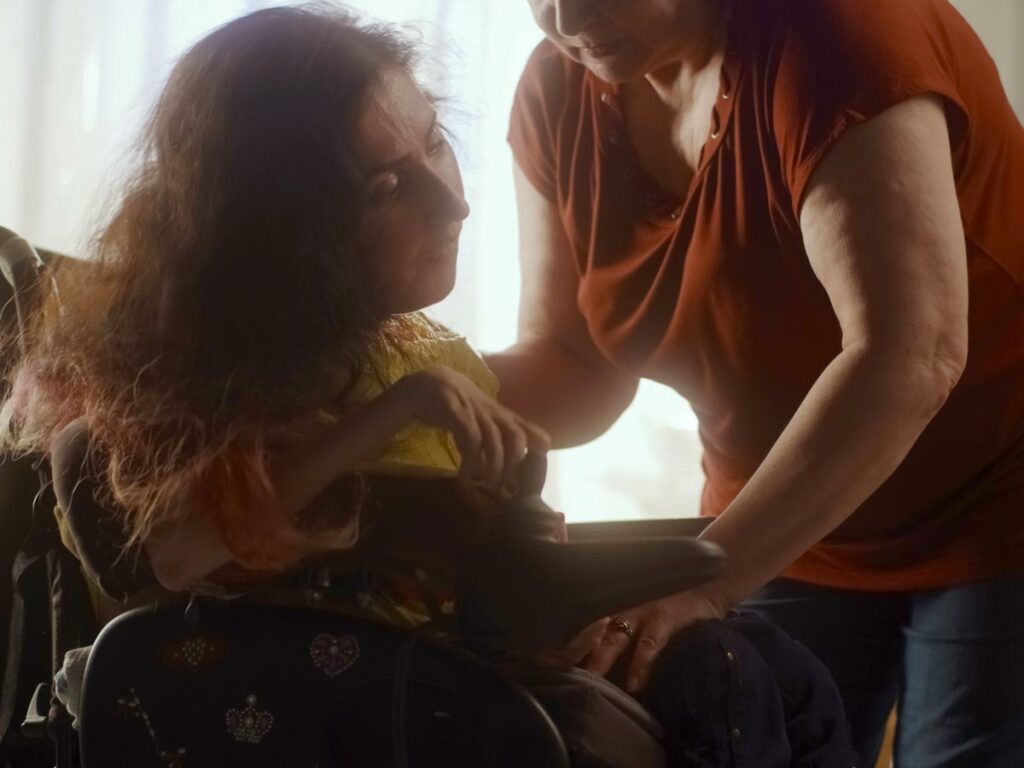Living with amyotrophic lateral sclerosis (ALS) (Lou Gherig’s Disease) can be incredibly challenging, not only for those diagnosed but also for their loved ones. The progressive nature of this tragic neurodegenerative disease can be unpredictable, leaving families uncertain of what lies ahead. You may feel isolated, anxious, and lonely as you constantly brace for the worst.
While thinking about and discussing end-of-life care for ALS is difficult and distressing, knowing your family’s options can be empowering. ALS hospice can provide the respect, compassion, and dignity they deserve, which can bring you tremendous relief.
Read on to learn more about when to consider hospice care, the benefits, and how to have challenging but essential conversations with loved ones about ALS hospice.
Are you or a loved one living with a chronic or terminal illness?
The Sage Family of Companies is here to help.
Are you or a loved one living with achronic or terminal illness?
The Sage Family of Companies is here to help.
What Is ALS Hospice?
ALS hospice is a specialized form of care devoted to ensuring the comfort of patients dying from this terminal disease. With ALS hospice, patients no longer receive treatment meant to stop disease progression. The goal of care shifts to maximizing comfort and quality of life at the end of life.
When is Hospice Recommended for ALS Patients?
The decision to transition to ALS hospice is highly individualized and deeply personal to each family. While there’s no fixed timeline, ALS hospice eligibility begins when the patient’s life expectancy changes to six months or less, determined by their physician. There are distinguishable symptoms that present during the final stages of ALS.
Key indicators that your loved one may be approaching the end of life include:
- Breathing Difficulties. ALS makes the vital organs deteriorate, which can lead to respiratory complications. If breathing troubles become so severe they require continuous medical intervention, ALS hospice might be the right choice.
- Loss of Mobility. The disease causes the muscles to atrophy, eventually robbing patients of the ability to move on their own. If your loved one’s mobility has become so limited that they can no longer perform routine activities on their own, they may need ALS hospice support.
- Ineffective Pain Management. Pain and other symptoms may become unbearable and unmanageable through standard medical interventions. In that case, ALS hospice services can step in to provide specialized care.
- Nutritional Challenges. ALS can lead to the damage and paralysis of the mouth and throat muscles, making it difficult or impossible to swallow, chew, and eat. If your loved one is no longer able to get proper nutrition, it can be a sign that it’s time for ALS hospice.
- Frequent Hospitalizations. Recurrent hospital visits for complications and management of symptoms may signal the need for ALS hospice.
Benefits of ALS Hospice for Patients
While hospice for ALS patients is end-of-life care, it’s important to remember that it doesn’t mean your family is giving up on your loved one. Rather, it’s about ensuring their comfort, dignity, and quality of life.
Here are some of the key benefits of ALS hospice for patients.
Pain and Symptom Management
ALS hospice teams are made up of doctors, nurses, counselors, dietitians, occupational therapists, and other healthcare specialists who are experts in providing symptom relief and comfort at the end of life.
They work closely with patients and their families to ensure that pain and distressing symptoms are effectively managed with a variety of treatments, including medications, physical therapy, nutritional guidance, massage, and alternative therapies like acupuncture and Reiki.
Emotional and Psychological Support
ALS is a devastating disease, particularly in its final stages. Isolation, loneliness, anxiety, and depression are all common among ALS patients. Hospice care includes counseling and other mental health services. These techniques can provide support and help your loved one cope with the complex grief that often comes at the end of life with this heartbreaking disease.
Flexibility of Care
Your loved one can receive ALS hospice service in a hospital, nursing home, hospice center, or from the comfort of their home. Choosing where to receive care is a deeply personal decision that you should make together with your family and your loved one’s doctor. Wherever you decide, ALS hospice will provide a comfortable and peaceful environment for your loved one to spend their final days.
Spiritual Guidance
Even if religion or spirituality haven’t played a prominent role in your loved one’s life, it’s not uncommon for people to grapple with spiritual concerns as death draws near. Through ALS hospice, chaplains and other faith leaders are available to your loved one and family. They can help address any worries and offer the spiritual guidance you may need.

Benefits of ALS Hospice for Families
Recognizing the important role that family members play in care, ALS hospice offers a variety of resources and support for loved ones.
Respite for Caregivers Caregivers often experience tremendous physical and emotional stress. Taking breaks to focus on your own well being is essential to prevent burnout. ALS hospice care provides respite and support, giving caregivers the opportunity to recharge and take care of themselves.
Emotional Support Watching a loved one deteriorate from ALS can take a massive toll on the whole family. ALS hospice provides a number of resources to help you all process these difficult emotions, including grief counseling and access to support groups.
Are you or a loved one living with a chronic or terminal illness?
The Sage Family of Companies is here to help.
Are you or a loved one living with achronic or terminal illness?
The Sage Family of Companies is here to help.
How to Talk to Your Loved One About ALS Hospice
Initiating a conversation about ALS hospice can feel uncomfortable and daunting, but it’s a vital step in ensuring your loved one receives the best support, when they need it most.
Here are some tips to approach this sensitive subject with love and compassion:
- Choose the Right Time. In general, it’s best to avoid bringing up upsetting and emotionally charged conversations in times of stress or crisis. Rather, aim to establish a calm, private, comfortable environment. You and your family should aim to engage in open dialogue and share feelings about end-of-life care openly.
- Express Love and Compassion. Begin the conversation by letting your loved one know you’re there for them and that you love them. Help them understand that you want what’s best for them, and you’ll honor their wishes.
- Practice Active Listening. Allow your loved one to express their thoughts and feelings, without interrupting or inserting your own opinions unless they ask. Pay close attention to what they’re saying, and give them space to talk through their concerns and fears.
- Involve the ALS Hospice Team. If both you and your loved one have decided ALS hospice may be an option, encourage them to meet with a hospice representative to ask questions, and directly address any concerns they may have.
FAQs
Here are some frequently asked questions about end-of-life care for ALS.
How Long Are ALS Patients in Hospice?
How long a person remains in ALS hospice can vary widely, as it depends on individual circumstances and the progression of the disease. Some patients may receive hospice care for a few weeks or even a few days, while others may need hospice support for several months. ALS hospice teams continually assess each patient’s needs and adjust their care plan as necessary to maximize their comfort as the end of life approaches.
Is ALS Painful at the End of Life?
At the end of life with ALS, patients may experience various types of pain and discomfort, although the degree and nature of pain can vary from person to person. Muscle cramps, muscle stiffness, or discomfort due to immobility are common during the end-stages of ALS. Many people with late-stage ALS also experience breathing troubles and dyspnea. This is the sensation of running out of air, which can be extremely distressing and uncomfortable.
Your loved one’s hospice care team is specially trained in pain management at the end of life, and will tailor a treatment plan to their specific needs.
How Long Does the Final Stage of ALS Last?
How long the final stage of ALS lasts can vary widely. Typically, patients may live with end-stage ALS for several months up to a few years. However, some patients may experience a more rapid decline, while others may go on to live for many more years.
How Do You Know When the End of Life is Near With ALS?
While every person is different and will experience progression of ALS at their own rate, there are certain signs that may indicate the end of life is drawing near. These can include significant muscle weakness, the inability to swallow, and severe breathing troubles, including an increased reliance on ventilatory support.
Mobility and the ability to communicate often become severely limited or completely impaired, and the patient may experience more frequent and severe infections, requiring recurrent hospitalizations.
End-of-Life Care for ALS: The Sage Family of Companies Can Help
ALS can be a lonely, crushing disease to live with, that not only affects patients but takes a major toll on caregivers and families. The Sage Family of Companies is here to provide support to ensure your loved one’s comfort through patient-centered and holistic ALS hospice care services.
Our dedicated team of skilled professionals, including doctors, nurses, counselors, clergy, and other healthcare specialists, will be with our family every step of the way. Together, we’ll care for your loved one with dignity, love, and respect during their final days.
References
- Amyotrophic lateral sclerosis StatPearls [2023]
- Approaching end of life in ALS The ALS Association [2017]
- What is respite care? NIH [2017]
- Symptom management and end of life care Neurologic Clinics [2016]






